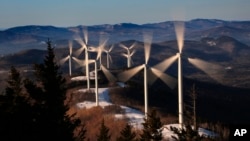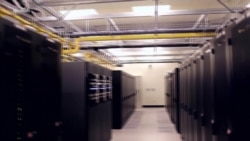This story was updated on July 18 at 1:58 pm
As the federal government retreats from dealing with climate change, major parts of corporate America are moving forward anyway.
Some of the largest companies in the United States are pushing local authorities for renewable energy, such as solar, wind or hydro power. In some cases, they’re pushing harder than those local authorities are ready to go.
One place to see this happening is Northern Virginia, in the suburbs of Washington, D.C.
The brains of the internet are housed here in anonymous office parks. Warehouse-sized buildings filled with row upon row of computers process clicks, taps and swipes from around the globe.
Northern Virginia is home to more of these data centers than anywhere else in the world, according to real estate firm JLL. Each building draws an average of 30 megawatts of electricity, roughly equivalent to 7,500 homes, according to Stan Blackwell, head of economic development at Dominion Energy, the region’s electric power company.
The region topped 1 gigawatt of capacity recently, according to real estate brokers CBRE. And another roughly 140 megawatts of data center demand has hooked up to the grid each year for the last several years, Blackwell said.
“The industry as a whole is the fastest growing segment in our territory,” he added.
Tech wants clean power
The companies behind those power-hungry buildings include some of the biggest names in tech: Facebook, Amazon and Google.
These companies have plans to get all their power from renewable sources. Google says it’s there already.
“It’s important that what we build leaves a positive legacy, that we don’t build it on the back of fossil fuels, but rather, we build it on the back of the next generation of energy technology of wind and hydro and solar,” said Brian Janous, lead energy manager for Microsoft, another major data center customer in Northern Virginia. Microsoft is aiming for 70% renewable energy by 2023.
So when Dominion submitted plans last year to meet demand growth with natural gas-fired power, Microsoft, Amazon, Apple and seven other companies wrote to the state regulator to demand less gas and more renewables.
“Dominion Energy ... fails to fully take into account the energy preferences of the data center industry — by limiting the amount of competitively procured solar energy, neglecting to consider energy storage as a cost-effective and beneficial energy resource, and continuing to plan for the development of additional natural gas infrastructure,” the letter said.
Blackwell says a mix of power sources is best to ensure a reliable supply. And Dominion has worked with tech companies before to get solar power on the grid.
Driving change
Facebook approached Dominion several years ago about building solar capacity to power a new data center.
“Regulation required you to build the lowest cost source of generation,” Blackwell said. “Solar resources in that case were slightly above that, and so they agreed to make up that difference.”
Facebook helped modify state regulations so Dominion could sell the company power from several solar farms and build several more, Blackwell says.
“Facebook drove that change and that new tariff and we’re very happy with it,” he added.
But the cost of wind and solar have plunged in just the last few years. In many cases they are now the cheapest option. Data center companies now say they have an economic case for renewables as well as a climate argument.
“We just don’t really see why utilities should be talking about building new fossil fuel plants that realistically may only have a useful life of a few years before their costs are significantly undercut by wind and solar paired with storage,” Janous said.
Regulators ultimately approved Dominion’s plan. But the company is required to include cost estimates for solar power plus battery storage in its next planning update.
Corporate commitments
Nearly half of Fortune 500 companies have set at least one climate or clean energy target, according to a 2017 report.
Even in states where fighting climate change is not a priority, local authorities are finding that companies are demanding renewable energy.
“Our first solar decision in the state of Alabama was based solely on the Walmart decision to come in and use solar power,” Alabama Public Service Commissioner Jeremy Oden told a recent coal industry conference.
Outside of Walmart, the state still has negligible amounts of solar power on the grid, and has no policies to encourage renewables.
But Oden says from retail to manufacturing, states are often finding that if they want to recruit major industries, offering renewable energy is a must.
“You’re seeing some of this demand, especially in these car companies that we’re dealing with, like Toyota and Mazda, and Honda and Hyundai, they all have ... (a certain amount of) alternative energy in their production. And so, whatever we do to recruit these, we have to offer (it).”
An earlier version of this story misstated Microsoft's timeline on embracing renewable energy. VOA regrets the error.







